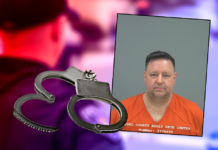Sgt. Stephen Judd, a spokesman for Maricopa Police, has responded to a second request for information previously released to other media by submitting a portion of it to inmaricopa.com.
“Here is what I gave the Monitor and now you,” Judd wrote in an email.
“07/08/08 at approximately 2211 hours, Maricopa Police and Fire responded to the area of Maricopa Casa Grande Hwy where they found a male subject that had been struck by a vehicle that had left the scene. The victim was pronounced deceased at the scene.
The name of the victim and details of the evidence found at the scene are not being released to protect the active investigation.”
In a conversation with another media representative a day earlier, however, Judd is quoted as having provided Murphy Road as a cross street with Maricopa-Casa Grande Highway, and that the body found in the road was believed to have been killed by a hit-and-run driver. The competing publication’s headline also notes that the victim was a pedestrian, a fact that has yet to be provided directly to inmaricopa.com (see “Police ‘looking into’ fatal accident”).
Judd’s response goes on to advise a representative of inmaricopa.com about who to call or quote in news stories.
“Please be careful about putting other agencies in a position where they are being quoted on investigations when it is not thier (sic) case. If it is a PCSO case get info from them. If it is Maricopa’s case, please follow the protocol for requesting information regarding incidents that occur in our jurisdiction.”
The competing media source, as well as inmaricopa.com, quoted from a Pinal County Sheriff’s blotter entry that the department routinely provides electronically to the media with basic summaries of police calls.
In addition, inmaricopa.com contacted a PCSO spokeswoman who later advised inmaricopa.com that the case was not in their jurisdiction and that the department had only assisted on the call (see “Witnesses report finding a body and part of a car on the Casa-Grande Highway”).
Maricopa Police as of July 1 began making its blotter available for on-site inspection. It is not yet available electronically, although it is processed on a contract basis through PCSO and could be emailed, as well.
Before July 1, the date of its first anniversary as a department, Maricopa Police consistently declined to provide public or media access to its blotter. Police blotters are routinely used in news gathering organizations as a way of identifying trends and spotting information that otherwise might not have been reported.
Judd said he could not do so until the city was prepared to publish it on its Web site. He added that if members of the media who recently attended a communications briefing meeting at the Police Station were serious about wishing to gain access that they would “have to go through Chief Melvin,” because he was following a directive from him.
A request on June 30 to City Manager Kevin Evans, copied to Department of Public Safety Direct Patrick Melvin and city spokeswoman Jennifer Grentz to begin complying with public records laws, however, resulted a day later in the creation of a system in which the public may sign out a three-ring binder to see summary records of calls MPD has handled within the past 24 hours (see “MPD arrests two burglary suspects overnight in Province”).
“I’m not going to send it to you,” Judd said in a telephone conversation with inmaricopa.com. “You’ll have to come and get it.”
Compliance does not require the electronic transmission of documents making such an arrangement acceptable under the letter of the law (Click here to view A.R.S. 39-121).
The first news report to come out of the process identified several police calls related to illegal fireworks and shots fired over the Fourth of July weekend (see “Police respond to illegal fireworks and shots fired calls over holiday weekend”).
And, without the PCSO blotter, inmaricopa.com would not have known to contact MPD regarding Tuesday’s fatal accident (Click here to receive an email link to the blotter item).
At first look, one might think the ability of the press to gain access to public records should be a private matter between the media entity and the agency making the denial (Click here to read A.R.S. 39, the Arizona Public Records Law).
David Cuillier, Information Committee Chairman of the Society of Professional Journalists’ Freedom Forum and assistant journalism professor at the University of Arizona, disagrees.
Reporting on incidents when government agencies fail to provide information is a growing practice within the news industry.
“One of the most effective ways of overcoming a public records denial is to tell people about it,” he wrote in the June/July 2008 issue of Quill, a trade journal for members of SPJ.
“The government isn’t saying ‘no’ to the journalist,” he continued. “It’s saying no to the thousands or millions of people in the community. As proxies for citizens, journalists are entrusted to tell the public when government keeps information secret.”
To learn more about journalism and open government click here.
To read or compare public records laws from all 50 states click here.
To read about the recent outcome of a similar situation in Maricopa County click here.
Photo by RuthAnn Hogue


















